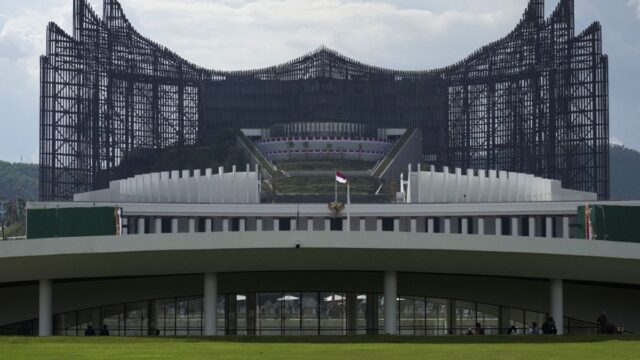The new, unfinished capital of Nusantara celebrated Indonesian Independence Day for the first time.
Against a backdrop of cranes and half-constructed government buildings, Indonesia commemorated its 79th Independence Day on Saturday in Nusantara, the future capital designed to alleviate the pressure on sunken Jakarta. This historic event, which took place in the midst of ongoing construction, symbolizes the Indonesia’s ambitious project to redefine its urban and government future.
He President Joko Widodo and his Cabinet They attended the ceremony at the new Presidential Palace, an imposing structure shaped like Garuda, the mythological protective eagle of Indonesia. This building, still under construction, stands as a symbol of the country’s aspirations for its new capital.
Originally planned as the official opening of Nusantara, the celebration was scaled down due to construction delays. The event, which was initially expected to have 8,000 guests, was limited to 1,300 due to insufficient infrastructure, underscoring the challenges facing this ambitious project.
Where is Nusantara and what construction projects they carry out
Nusantara, located on the island of Borneo, is conceived as a futuristic and ecological citydesigned to address Jakarta’s pressing problems, including the threat that a third of the current city could be submerged by 2050 due to uncontrolled extraction of groundwater and sea level rise caused by climate change.
Construction of Nusantara, which covers 2,600 square kilometers of Borneo rainforest, began in mid-2022. Planners envision a green city, abundant in forests and parks, powered by renewable energy and with smart waste management. However, the project has faced criticism from environmentalists and indigenous communitieswho argue that it damages the environment, threatens endangered species like orangutans, and displaces indigenous people who depend on the land.
Project financingwith an estimated budget of $33 billion, relies heavily on private sector investment, with the Government contributing only 20%. To attract investors, Widodo has recently introduced incentivesincluding land rights of up to 190 years and substantial tax benefits.
Despite the challenges, President Widodo has already started work on the new presidential palace in Archipelagoholding his first cabinet meeting there last Tuesday. This symbolic move underlines the Government’s determination to move forward with the projectdespite the uncertainties and delays.
With a population of approximately 275 million inhabitantsIndonesia is the largest economy in Southeast Asia. The Nusantara project represents not only a geographical change, but also a bold vision for the country’s future. However, with Widodo scheduled to step down in October after 10 years of leadership, Nusantara’s future and its completion timeline remain uncertain.







